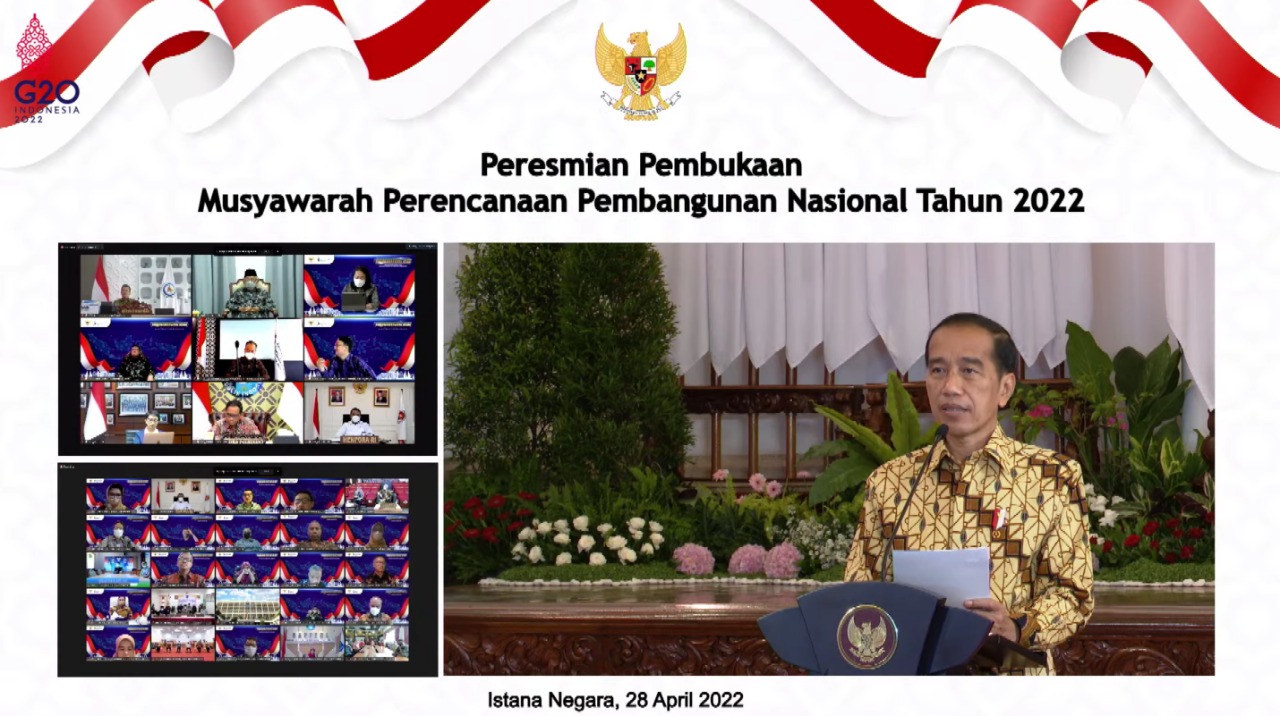President Jokowi Inaugurates 2022 National Development Planning Conference

President Jokowi at the 2022 National Development Planning Conference at the State Palace in Jakarta, Thursday (04/28). (Source: Screenshot)
President Joko “Jokowi” Widodo Thursday (04/28) opened the 2022 National Development Planning Conference (Musrenbangnas) at the State Palace in Jakarta.
The conference held both online and in person was in line with the formulation of the 2023 Government Work Plan (RKP) adopting the theme of “Increasing Productivity for an Inclusive and Sustainable Economic Transformation.”
“In harmony with the theme of the 2023 RKP, we must work hard to increase productivity for an inclusive and sustainable economic growth,” the President said in his opening remarks.
According to the President, the world is currently facing a difficult economic and political situation that is full of uncertainties. As the pandemic is not completely over yet, another disruption occurred, causing a sharp global inflation and a global economic slowdown.
Therefore, the President urged everyone to remain vigilant and to take anticipatory measures.
“Everyone, we must have a sense of crisis. Do not work in ‘business-as-usual’ mode. Be careful, we must all have a sense of crisis, so we must have good planning, we must have the right scenario in facing this uncertain situation,” he said.
The President also expressed gratitude that Indonesia’s economy has shown a positive trend with trades continuing to have good performance and trade balance surplus constantly showing better figures.
“The trade balance surplus is also positive. In February, it was at [US$]3.82 billion and in March, it was at [US$]4.5 billion. This is excellent,” he said, adding that credit growth increased in February, while the manufacturing purchasing manager index (PMI), real sales index, and consumer confidence index in March are above normal.
“The real sales index is also above normal. In March, it was at 14.5 percent and the consumer confidence index is also already above normal,” he remarked.
Meanwhile, on that occasion, Minister of the National Development Planning (PPN)/Head of the National Development Planning Agency (Bappenas) Suharso Monoarfa underscored the importance of digital transformation to achieve economic transformation.
“Digital transformation needs to be balanced with digital industrialization, so Indonesia will not only become a big consumer of imported digital products but also a big digital producer that provides supplies for domestic and foreign needs. Therefore, Ministry of PPN/Bappenas has composed the Indonesia Digital Industry Roadmap as a part of Indonesia’s economic transformation,” he said.
For the record, the 2023 RKP is elaborated in the 7 National Priorities that are implemented through a number of major projects, namely the development of priority industrial areas and smelters; micro, small, and medium enterprises (MSMEs) integrated management; food estates; priority tourism destinations; acceleration of renewable and conservation energy development; reform of social protection system, national health system, and vocational education; accelerated reduction of mother mortality and stunting rates; Papuan customary territories: Lao Pago and Domberay; the construction of the New Capital of Nusantara (IKN); integrated main port network; digital transformation; and construction of hazardous and infectious waste treatment facilities.
As the fourth RKP in the 2020-2024 National Medium-Term Development Plan, the 2023 RKP is also described in the 8 Directions of Priority Development Policies, which include (1) acceleration of extreme poverty reduction; (2) human resource quality improvement through health and education; (3) tackling unemployment in line with increasing the number of decent jobs; (4) enhancing the recovery of business world; (5) industry revitalization and applied research reinforcement; (6) low-carbon development and energy transition; (7) acceleration of basic infrastructure construction for clean water and sanitation; and (8) the construction of the New Capital of Nusantara. (MAY/UN) (DH/MUR)








